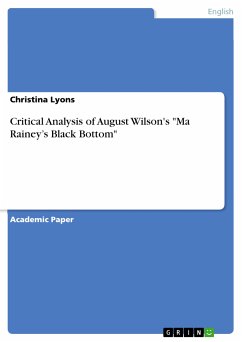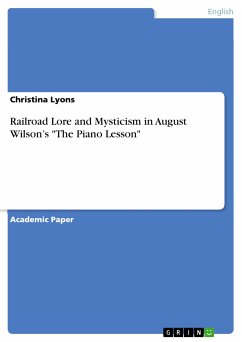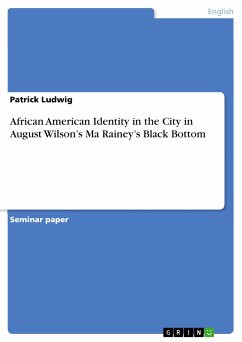Academic Paper from the year 2006 in the subject English Language and Literature Studies - Literature, grade: A, Southern Illinois University Carbondale (Department of English), course: English Drama (August Wilson), language: English, abstract: In his play Ma Rainey's Black Bottom, opened at the Yale Repertory Theatre on April 6, 1984, the African American playwright August Wilson evokes provocation, individualism versus general conceptions of the Black man's world, conservatism versus progressiveness, and exploitation. The play surprises by its unanticipated, cruel ending, is relatively poor in action but subtly embeds external conflicts (respectively, racial issues), as well as internal conflicts (trivial quarrels among the characters). Since I see a crucial juxtaposition between two characters - Toledo, the intellectual, and Levee, the ignorant, who theatrically become opponents in the final man-slaughter scene - I am focusing on a comparison between those two after a brief description of the plot and the set of characters. The first third of the play bears a faint resemblance with Waiting for Godot, because it depicts the impatient White producer and manager, as well as the quarrelling Black band members waiting for their singer, the famous Ma Rainey, who takes her time getting her "big black bottom" to the rehearsal scheduled for 1:00 p.m. She banishes one band member, ignorant, conceited, and vain Levee (who is constantly seen polishing his shoes), from future productions. Levee dreams of establishing his own band, anyway, hoping to become famous with his more modern songs - "not this old jug band shit" (16) - that the White producer has promised to record with him. However, the latter retracts his offer, offering him ridiculous five dollars for each of his songs, leaving Levee stranded, who is already so overheated that he overacts, pulls his knife, and in affect stabs his colleague Toledo who accidentally steps on his shiny shoe. This shoe stepping scene (which takes place on page 87: "Hey! Watch it... shit! You stepped on my shoe!") is foreshadowed by a similar event when another band member, Slow Drag, by mistake commits the same "crime" (p. 26: "Damn, Slow Drag! Watch them big-ass shoes you got.") The irony of the play is that the most understanding of all characters is killed for nothing, for having left a tiny mark on the unstained, immaculate, eleven-dollars-worth of shoes.
Dieser Download kann aus rechtlichen Gründen nur mit Rechnungsadresse in A, B, BG, CY, CZ, D, DK, EW, E, FIN, F, GR, HR, H, IRL, I, LT, L, LR, M, NL, PL, P, R, S, SLO, SK ausgeliefert werden.









